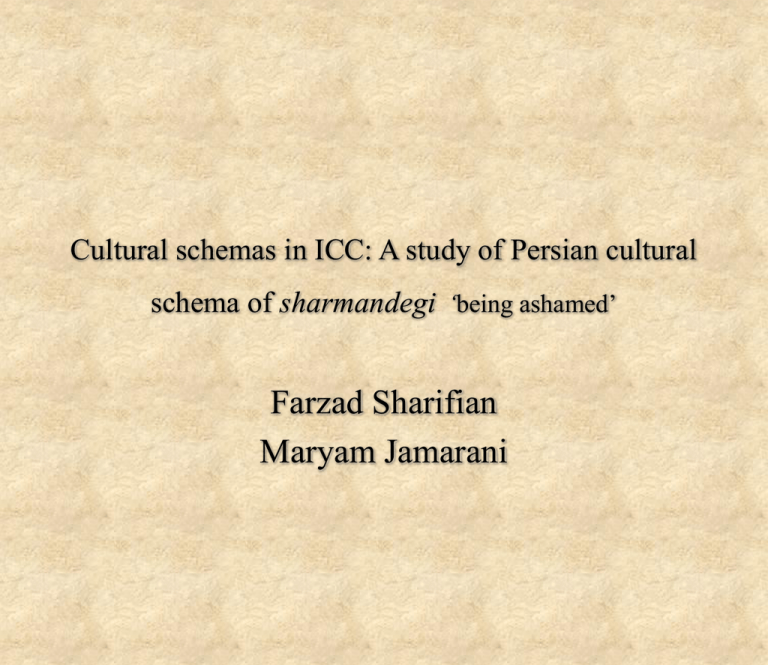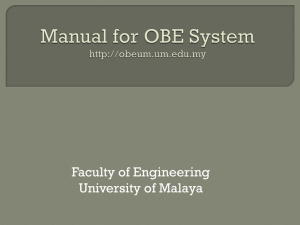Cultural schemas in intercultural communication
advertisement

Cultural schemas in ICC: A study of Persian cultural schema of sharmandegi ‘being ashamed’ Farzad Sharifian Maryam Jamarani An Iranian student at Shiraz University receives from her American lecturer the recommendation letter that she had asked him to write for her and then turns to him and says, “I’m ashamed”. Bewildered by the student’s response, the lecturer asks, “What have you done?!!!” Theoretical framework Cultural cognition & Language Complex Adaptive systems Heterogeneously distributed Cultural conceptualizations (cultural schemas, categories, metaphors, etc) Persian cultural pragmatic schema of Sharmandegi ‘being ashamed’ Expressing gratitude Vaghan ke man ro sharmandeh kardin , I really THANK YOU from the bottom of my heart, Really that me DO-marker ashamed you did … (You really made me ashamed). Offering goods and services Khahesh mikonam befarmain, sharmandam, ghabeleh shoma ro nadareh, Please help yourself, I’m ashamed, worthy of you DO-marker doesn’t have (Please help yourself, I’m ashamed, it’s not worthy of you). Requesting goods and services Sharmandam, mitunam khahesh konam chand daghighe az vaghtetuno be man bedid? I’m ashamed, can I beg do some minutes from your time to me you give. (I’m ashamed, can I beg some minutes of your time?) Apologizing Vaghean sharmandam ke saro sedayeh bacheha nagzasht shoma bekhabid. Really I’m ashamed that noise kids didn’t let you sleep. (I’m really ashamed that the noise from the kids didn’t let you sleep.) Accepting offers and refusals 6) Sharmandam nemitunam biam oonja I’m ashamed I can’t come over there (I’m ashamed, I can’t come over there) The schema of sharmandegi The overarching schema of sharmandegi encourages Iranian speakers to be very much conscious of the imbalances in their give-andtakes in daily social interactions. For example, the speaker is urged to be overtly conscious of the resources (such as time, money, effort, etc) that others have or will expend for them in various forms, and to acknowledge them by expressing the feeling of ‘shame’. The speaker is also encouraged to consider the possibility that any contribution from them, may not be in accordance with the other party’s “social esteem”. The schema of sharmandegi in intercultural communication Accepting an offer Expressing gratitude Bringing excuse Apologizing Refusal Requesting goods and services Offering goods and services Intended function of Sharmandegi Example Intended function Lydia: I can pick your daughter from school today and this way I can spare you a trip. Mahin: You make me ashamed, I don’t want to bother you. But it would be great if you could do that. Expressing gratitude in accepting an offer Lecturer: I’m ashamed to tell you Expressing sympathy/regret that you have failed this subject. Student: No, I am sorry. It is not your fault. I was not prepared for the exam. Roya tells her neighbor who mows Expressing gratitude her front lawn voluntarily: “You always make me ashamed by mowing my lawn”, and the neighbor stops doing so. Intended functions of Sharmandegi As an expression of a feeling Gratitude (You always make me ashamed by mowing my lawn.) Embarrassment (I am ashamed. I call you whenever I have a request.) Apology (So sorry, the food is not good.) Sympathy/regret (I’m ashamed to tell you that you have failed this subject.) As a disclaimer for a speech act For an excuse (I am ashamed I have been very busy lately. But will catch up with you very soon.) For offering an apology (I am really ashamed. I had totally forgotten to return your plate.) For a request (I am ashamed, can I possibly take two hours of your time sometime this week?) For refusal (I’m ashamed. I would have loved you to come over to my house, but I have already made an important arrangement.) Anglo-Australian interpretation of the sharmandegi formulaic expression Example Lydia: I can pick your daughter from school today and this way I can spare you a trip. Mahin: You make me ashamed, I don’t want to bother you. But it would be great if you could do that. Intended function Expressing gratitude in accepting an offer Interpreted function -- Expressing guilt/awkwardness -- expressing indebtedness -- expressing concern about imposition Example Intended function Lecturer: I’m ashamed to tell Expression of you that you have failed this sympathy/regret subject. Student: No, I am sorry. It is not your fault. I was not prepared for the exam. Roya tells her neighbor who mows her front lawn voluntarily: “You always make me ashamed by mowing my lawn”, and the neighbor stops doing so. Interpreted function -- Expressing regret -- Expression of regret over being deeply troubled -- Implies an expression of guilt over a misdeed Expression of gratitude -- Expressing shame -- Expressing guilt as a result of lack of reciprocity -- Expressing distress Lecturer: I’m ashamed to tell you that you have failed this subject. Student: No, I am sorry. It is not your fault. I was not prepared for the exam. The word ashamed is appropriate if the student and lecturer were having an affair and after the student dumped the lecturer, the lecturer is ashamed that he/she let this affect how he/she marked the student. (An Anglo respondent) Roya tells her neighbor who mows her front lawn voluntarily: “You always make me ashamed by mowing my lawn”, and the neighbor stops doing so. Mr. Anderson may have taken her words to mean: “By mowing my lawn you are implying that I’m not capable of doing it myself,” or more likely “By mowing my lawn you make me feel negligent and as though you think I am lazy.” He may have been initially shocked that his kindness had been misunderstood, and not wanting to threaten Roya’s face any more, he stops the offending behavior. A second layer of misunderstanding occurred when Roya, could not understand her neighbor’s reason for suddenly stopping mowing her lawn. Misunderstandings evoked by sharmandegi schema in an ICC context Expressing gratitude vs. expressing distress for having done something wrong Disclaimer for a request vs. expressing distress for having a weakness Expressing sympathy/regret vs. expressing guilt Conclusion The findings of this study suggest that the framework of cultural conceptualizations and analytical tools such as cultural schema provide a strong perspective for studies of intercultural communication. Viewing cultural conceptualizations as heterogeneously distributed among the members of a cultural group would be beneficial in avoiding the dangers of the development of stereotypes and overgeneralizations.









